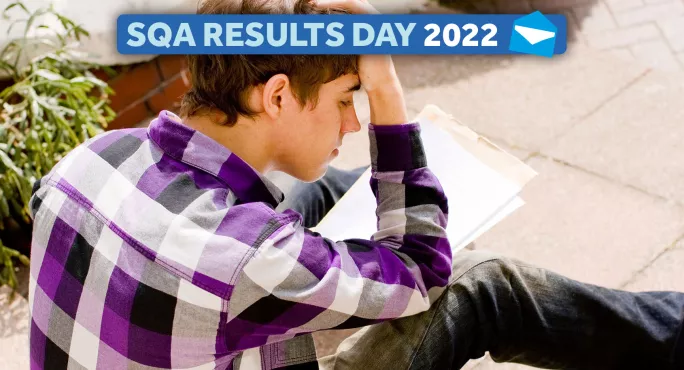SQA exams overhaul will need proper resourcing

Students, teachers and schools will be nervous about what tomorrow will bring when the exam results land. But at a national level, we pretty much know what to expect because we have been told by the Scottish Qualifications Authority (SQA).
Back in February, Scotland’s exam body made it clear that it would be “more generous” in its approach to grading and “the overall outcomes in 2022 will represent an intermediary position between 2021 and pre-pandemic years”.
So, simply put, we can expect the pass rates at National 5, Higher and Advanced Higher to be better than 2019, but worse than last year.
This manipulation of exam results has always taken place - in a piece for Tes in the wake of the 2020 results fiasco, Jo-Anne Baird, a professor of educational assessment at the University of Oxford, summed up the system thus: “The principle...is that the same percentages of students should get the grades as last year, all else being equal.”
However, the way exam results are arrived at has become increasingly controversial because, since Covid struck, it is now better understood and also - having seen how the results can change when a different system of assessment is in place - people have started to question more loudly if exams really are the best way to measure what students know and can do.
This year it will be interesting to see how low grade boundaries - the mark needed in an exam to achieve an A, B, C or D - have been set to enable the expected proportion of pupils to pass.
A major criticism of the Scottish government has been the lack of research that has been done into the impact of the pandemic on learning, with the result that we still have no real sense of how badly pupils have been hit by the national school closures but also by the disruption caused by high absence levels.
At primary, we have the teacher judgements about whether or not pupils are hitting the expected level for their age and stage in literacy and numeracy. When they were published last year, they showed that the proportion of pupils achieving the expected level was the lowest it has ever been since the data started being recorded.
However, beyond that there is a feeling - expressed by NASUWT Scotland’s Mike Corbett among others - that we are operating in the dark trying to address a problem but with little idea of how big it is or where we should focus our efforts.
If grade boundaries have had to be set low, that might help put paid to any notion that last year was a normal year and that we are well on our way to education recovery.
Of course with the increased understanding about how the exam system works - or doesn’t - debate is now raging about how it needs to change and what should replace it.
In Scotland, this is no hypothetical discussion. An independent review of assessment and qualifications is underway and, when schools return after the summer holidays, they should find an invitation to feed into that review, which is being led by Professor Louise Hayward.
The review is expected to make its final recommendations to the government in March and Professor Hayward has said she wants it to be conducted “in plain sight” so that any issues with the proposals can be ironed out.
What that review will recommend is as yet unknown, but the government has already said it does not plan to scrap exams altogether. The reality, though, is this caveat still gives plenty of scope to overhaul the system, given that many in the profession believe exams still have a role to play; the real question is what should the balance be between exams, coursework and practicals, and teacher assessment?
In that 2020 article for Tes, Professor Baird wrote that exams, algorithms and centre-assessed grades have “different fairness logics” and that which is seen as most suitable “is a matter of values”.
What is indisputable is that in 2020 and in 2021, a higher proportion of students passed their exams - and in Scotland, the jump in the pass rate was more pronounced for those living in the most deprived areas. In 2019, 65.1 per cent of pupils living in the most deprived areas of Scotland (Scottish Index of Multiple Deprivation - SIMD - quintile 1) passed Higher, but in 2021 83.1 per cent did so; in 2020 that figure was slightly higher at 85.6 per cent.
At an individual level that will have had a huge impact on students - remember the government funded more university places because more young people had to the grades to get in - just as the expected lower pass rate and wider attainment gap this year will also, unfortunately, have a huge impact on pupils.
But different assessment systems have different implications in terms of staffing and workload. While teacher-assessed grades might have benefited some pupils, many school staff members say the workload that system generated was unsustainable for them.
So the key to any change to the way Scottish pupils are assessed is that it is properly resourced.
There has to be an understanding that if teachers are to play more of a role in assessing students, then they will need the time to do it.
Emma Seith is a senior reporter at Tes Scotland. She tweets @Emma_Seith
You need a Tes subscription to read this article
Subscribe now to read this article and get other subscriber-only content:
- Unlimited access to all Tes magazine content
- Exclusive subscriber-only stories
- Award-winning email newsletters
Already a subscriber? Log in
You need a subscription to read this article
Subscribe now to read this article and get other subscriber-only content, including:
- Unlimited access to all Tes magazine content
- Exclusive subscriber-only stories
- Award-winning email newsletters
topics in this article



